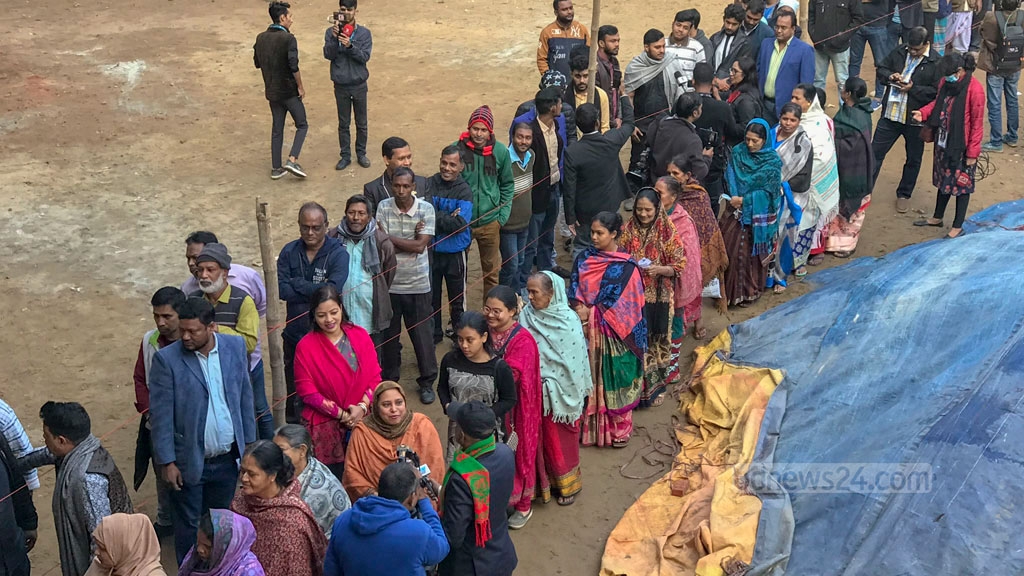Home
+
Voters and analysts point out a lack of festivity and competition along with fears of violence amid the BNP’s boycott

Published : 15 Jan 2024, 05:39 PM
The turnout in the general election has slumped to around 42 percent this year from 80 percent in 2018 despite the Awami League's efforts to whip up enthusiasm among the voters amid the BNP’s boycott.
Although the Awami League allowed its rebel candidates to contest without the fear of any backlash from the party, the election lacked competition, believe voters and analysts alike.

According to them, this strategy led only the supporters of the party’s rival factions to the polling stations to cast their votes on election day, but failed to have an impact on the general public.
Many did not visit the centres because it was all but certain that the Awami League would win the race.
The voters bdnews24.com interviewed for this report also pointed out a lack of festivity during the campaign and fears of violence after arson attacks on polling stations and buses before the polls.
Lutfunnahar Furkan, a voter in Narsingdi, said the candidates’ campaigns were not as festive as she had seen in the past.
“But still, I did not want to waste my vote because I think people should be encouraged to cast their ballots,” she explained about why she voted.

Another voter, Monir Chowdhry of Savar, said none of the four eligible voters in his family went to the polling station because all three major candidates in the constituency were Awami League leaders.
“So, the outcome would have been the same [a victory for the Awami League] even if we had voted,” he said.
Sabuj Mia of Mirpur in Dhaka said fears of violence also played a role in his family’s decision to stay away from the vote.

“The Jatiya Party is not strong enough to become the Awami League’s opponent. So, why would I go to the polling centre braving fears of trouble?”
The analysts also do not see any reason for a high turnout with one of the dominant political forces away from the election.
“When voters have a real choice in front of them, they feel encouraged to go to the centre. In countries where voter turnout was high, those elections were 'genuinely competitive' and involved all parties. A 'fully contested' election will turn the electorates towards the centre,” said election analyst Abdul Alim.
“Almost all parties have supporters in Bangladesh; When a major party does not go to the polls, its supporters do not want to vote.

"At the same time, when the general public think that this candidate or that candidate is sure to win or lose, they lose interest in voting.”
Human rights activist Khushi Kabir also blames the election environment.
"Sometimes there are incidents like clashes at polling stations, because of which many voters do not want to come. This time there was a hartal [shutdown].
“Many did not obey, but some were afraid to go out. If they get into trouble, what does it matter even if they vote in an uncontested election - these are what they think."
Khushi Kabir said that even some ruling party supporters were not interested in the election because they were not involved in the process to nominate the candidates.

“Voting environment should be made voter-friendly so that they get motivated,” she suggested.
Even after the deployment of troops, there were incidents of violence in some centres. “If this happens even amid the presence of the army, how will the public be encouraged?”
Shantanu Majumder, professor of political science at Dhaka University, thinks that many voters did not want to come to the center because of the lack of balance between the rival parties.
“When a party's victory is assured, a large section of that party's voters do not want to come to the centre.”
"This time Awami League's victory was certain as the BNP did not contest,” he said